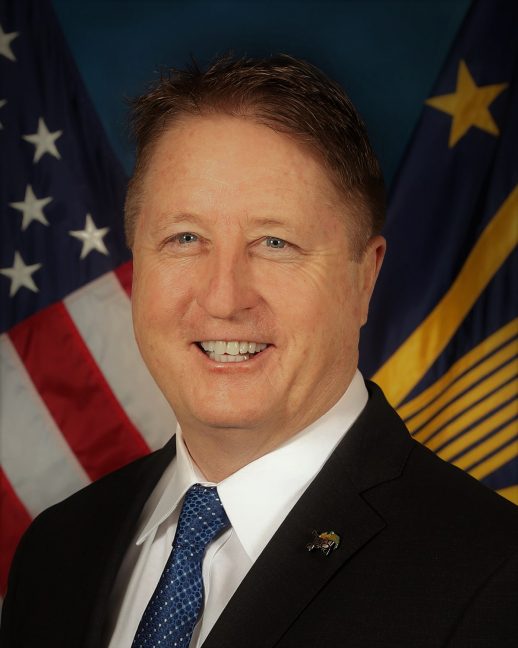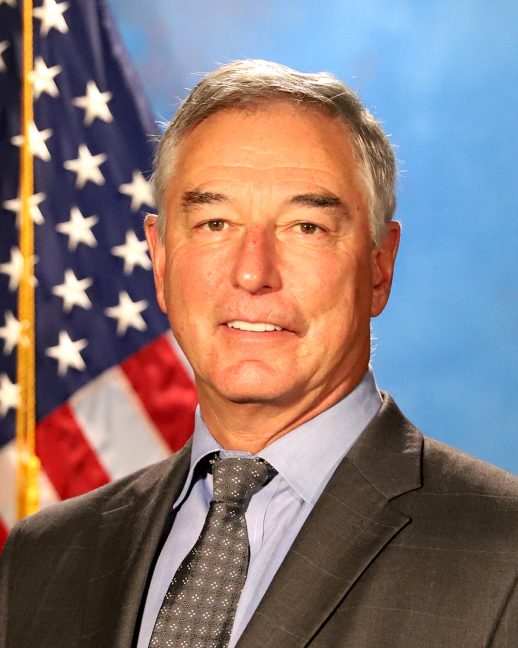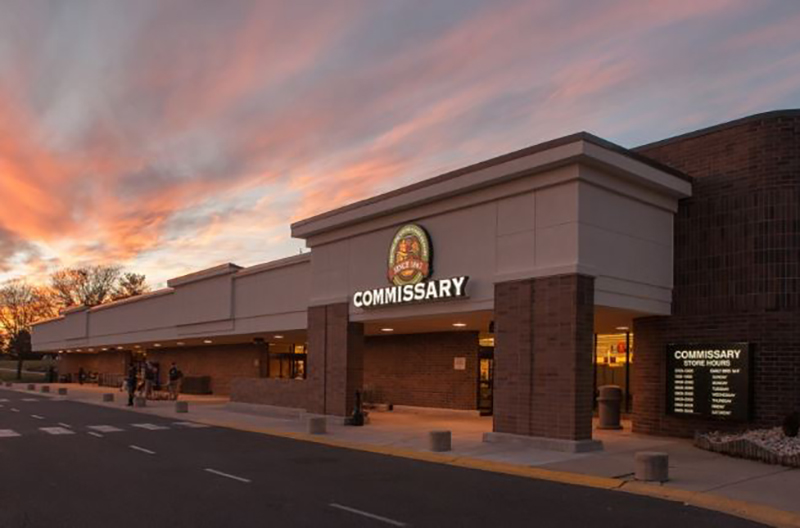Officials talk about agency’s purpose, recent transformation, modernization efforts
The Defense Commissary Agency, headquartered at Fort Lee, Virginia, operates a worldwide chain of commissaries providing groceries in a safe and secure shopping environment to U.S. military personnel, retirees, service-related disabled veterans and their families.
Authorized patrons can purchase items tax free, plus a 5-percent surcharge, which covers the costs of modernizing and building new ones. The commissary benefit can save shoppers more than 25 cents on the dollar over other retailers’ prices every time they shop.
Four of DECA’s top personnel recently spoke with The Shelby Report about the agency’s purpose and recent transformation and modernization efforts.
William Moore, director and CEO of the Defense Commissary Agency; U.S. Marine Sgt. Maj. Michael Saucedo, senior enlisted advisor to the director (chief customer officer); Jim Flannery, chief transformation officer; and Gary Frankovich, head of the DECA Corporate Communications Office, talked about the service the agency provides to its customers.

When Moore was hired by the agency in 2020, he said he had “zero retail experience.” His mandate was to transform DECA for the 21st century. To assist him in attaining that goal, he hired Flannery as his industry expert.
“He’s been priceless in accomplishing our transformation,” Moore said. “I couldn’t thank him more.”
Moore said the commissary system goes back more than 150 years, and each branch of the military had operated its own commissary agency. In 1991, the commissaries were consolidated under one agency – DECA. At that time, there were more than 400 stores in operation. As the Department of Defense has decreased in size by using more technology, the number of commissaries dropped to a total of 236 stores around the globe, Moore said.
DECA serves more than three million eligible patrons. This includes a small segment of DOD civilians.
The commissaries are part of the compensation package for military personnel, Moore said, allowing them to get their groceries cheaper than in regular retail stores. “That’s because we receive an appropriation from Congress that really pays for most of our operating costs, with the mandate that we sell groceries at a significant savings to military families,” Moore said.
He noted that he grew up in a military family, where “every dollar counted.” Moore said his mother would take him and his sister to the commissary every week to save money.
“That’s part of my passion. I was in one of those ‘struggling’ military families, and [the commissary] made a difference to our quality of life. And that’s why we exist, to improve military family quality of life with the commissary.”
Saucedo noted the issue of food insecurity in the military. He said about 24 percent of U.S. active duty forces are experiencing some level of food insecurity issues.
“We see ourselves as a solution. We are here; our mission is to provide low-cost groceries to our service members and our families.”
DECA has three U.S. based regions – East, Central and West. The Pacific region includes part of the U.S. but also stores in Korea, Japan and Guam, among others. European stores are located in the U.K., Italy, Spain, Turkey, Egypt and Saudi Arabia. There are 178 stores in the U.S. and 58 overseas.
“Part of our mission is to bring the taste of home to the service members and their families, wherever they may be,” Moore said. “It’s hard to get certain products in certain countries. But behind that, we also bring a taste of the local [area]. This is how DECA has evolved over time.”
He said DECA customers want to experience local cultures and taste local foods.
Transforming DECA
Moore started at the agency at the end of August 2020, “right in the middle of COVID.” Flannery and Saucedo started in October 2020.

“We all came in at a very difficult period for the nation and the world, actually. And that’s when we began this transformation of the Defense Commissary Agency,” Moore said.
Looking back, he said in 2012 DECA had $6 billion in sales. As the DOD worked on increasing efficiency, budget cuts were made and DECA began cutting certain services. From 2012 until Moore arrived in 2020, DECA had a “linear 5 percent decline bi-annually. Every year we were dropping in our sales by about 5 percent.”
He said DECA revenue was at about $4 billion, which was a decrease from 2012.
One of the cuts in services was to the DECA outreach office, which helped get the word out about the commissary benefit. Moore said the DOD brings in people every year to defend the country. Many leave after a three-year tour, and more than 70 percent of active duty military personnel are between the ages of 17-25, he said.
“We had stopped telling them about their benefit…and then they stopped shopping.”
When Moore arrived, he did a 100-day assessment as part of a strategic planning effort. He looked at strengths, weaknesses, opportunities and threats. In December 2020, he assembled senior DECA leaders off-site and briefed them on what he had observed. During that time, he also had held “listening sessions” with the agency’s top suppliers. He asked for their input and got it.
“From that, we built a transformational game plan, a strategic plan, starting with ‘what is the vision of our agency?’ So we created a vision,” Moore said.
That vision is “to be the grocery provider of choice for our eligible patrons – delivering a vital benefit exclusively for our military community and their families.” Moore said they set a date of Dec. 31, 2022, to achieve that vision.
To do so, they set six lines of effort: improving supply chain, implementing e-commerce, boosting customer service, creating demand to increase sales, improving facilities management and investing in the workforce. Moore said he also established an office of primary responsibility for each line of effort.
Each month, he reviewed progress with the OPRs. Moore noted that 80 percent of the obstacles brought to him were perceived rather than real.
“Taking risks and overcoming some of these perceived obstacles were huge parts of this journey and how we were able to successfully move the agency forward, in the midst of COVID and all the other challenges we were wrestling with.”
Flannery added that what really tied everything together was “a relentless focus on the patron.” He said listening to feedback from shoppers was an important part of the process. That focus “has been the catalyst for all these lines of effort.”
Saucedo said he focused on outreach. He talked with senior enlisted leaders in all branches of the military and worked with DECA’s marketing team. “For the first time ever, we’re actually teaching about the commissary benefit, this congressionally mandated benefit, in boot camps for our recruits…that’s where the savings means the most.”
He said E5-ranked personnel and below make less than $40,000 per year. “They’re the ones that the paycheck gets stretched very thin, and they really need to understand that they do have a benefit and it’s mandated by Congress.”
Saucedo said he speaks at senior enlisted engagements, senior officer engagements, at the Pentagon and around the country. He also speaks to veteran and military support organizations, as well as to spouse groups, to teach them about the commissary benefit.
He added that there was a culture change in the agency headquarters itself to focus not just on the patrons outside the gate coming into the stores but also the employees.
“I think the culture change here in the agency is we really had to get them to focus that the customers, for us, are the people in the stores…we’re not quite there 100 percent, but I think we’re getting there.”
Moore said Saucedo getting commissary education into the boot camps “was huge” to inform the service members of this benefit. “Now, those folks who need the commissaries the most, with the least amount of buying power, now understand this benefit is right there just waiting on them.”
Back in black
The transformation process has been difficult, but Moore said by the end of 2021 they had “started turning the tide.” By the end of January 2022, “we were in the black, so to speak. And things have just been growing exponentially since.”
DECA finished 2022 up about 3.5 percent in sales (non-inflationary) and since has seen double digit sales growth, running about 12 percent for the fiscal year.
Flannery noted that the growth is not inflation driven. When they first implemented the game plan, they took prices down about 5 percent “right across the board.”

Another thing the agency did was listen to the patrons about hours of operation. It took 155 stores operating from six days a week to seven, and several more went from five to six days of operation. They are opening earlier in the morning and staying open later at night.
“We did that by leveraging technology,” he said. “We didn’t increase our costs…we were able to do that all within our resources.”
“We’re doing really well,” Moore said. “We had what I would call A’s or B’s on five of the six lines of effort. Facilities had some resourcing challenges. We had a C-minus in line of effort five, but we made great progress across all those.”
He noted that, when he started, only five stores offered online shopping. DECA had a seven-year, $55 million plan to get e-commerce into every store. Now, all stores offer online shopping and payment, along with an app. “That was a huge win for us.”
Online delivery is offered at 11 locations as a pilot program, and it has been successful. “Our sales online are triple what they are in stores without delivery. I call it the third leg of the convenience stool. You need online shopping, online payment and delivery.”
Moore said they will be expanding delivery to all locations.
Flannery also noted that out of stocks are one of DECA’s biggest barriers. Of its 236 locations, many are overseas or in remote areas. As the industry has gone through supply chain disruptions over the last couple of years, DECA has had to protect those locations.
“When you take that limited availability and ship it overseas, it’s amplified the challenge that we have in the U.S. and our bases here. We’re working that like crazy.”
He said DECA has gone through “phenomenal growth.” That has meant maintaining continuity of supply overseas by airfreighting “a ridiculous amount of goods to our overseas bases. And it’s made staying in stock in the U.S. more difficult.”
Flannery said that is the biggest challenge going forward. “If the supplier community can figure out how to keep us supplied with the growth that we’re seeing, we can deliver that benefit to more patrons.”
Gameplan 2.0
When they achieved the goals set for their first planning strategy, Moore said they moved to gameplan 2.0. They went from six lines of effort to eight, which “in itself is a demonstration of cultural change with our DECA senior leaders.” When they saw the success they had achieved, going forward each wanted their own line of effort.
E-commerce was changed to “omnichannel” and “fresh” was added. Customer feedback put produce at No. 3 in a list of complaints. “We don’t do produce well,” Moore said.
DECA is focusing on providing fresher produce, along with meat and deli items.
Another line effort that was added is data and analytics. “We do not have good, clean data that’s near real time that can help us make better decisions. We’re going to clean that up, as well.”
Moore said Secretary of Defense Lloyd Austin, who has “taking care of people better” as a priority, also is helping. He has worked with Austin’s deputy, Kathleen Hicks, on additional ways to offer savings to commissary patrons.
All these actions have gotten patrons to “rethink their commissary and actually give us another whirl,” Moore said, adding that foot traffic is up significantly this fiscal year, along with transactions.
DECA has set Dec. 31, 2024, as the goal date to achieve the lines of effort in the new game plan.
FMI Midwinter
Moore and other DECA officials attended the recent FMI Midwinter Conference. He said one of the greatest values of the conference is the ability to reach a lot of stakeholders in a single forum.
He noted that it took him three months to meet with 28 suppliers when he first came on board at the agency. At the FMI conference, they met with 29 of their top suppliers in one weekend. “That was massive for us.”
They were able to deliver the same, consistent message to their suppliers and hear back from them, along with finding out what they need from DECA to better supply its needs. It also was an opportunity to meet other retailers.
“I don’t think anybody views us as competition, because we’re in this unique space with unique patrons doing a service to the nation. But they could share best practices or hard lessons learned that we can learn from,” he said. “Those were really key to our transformation.”
Flannery added that last year was DECA’s first time at the FMI conference. “It’s really helped us bring the outside in, in a way that we haven’t been able to do before.”
He said the “idea exchange, investment of time and resources and energy into helping us meet the needs of these patrons just took a quantum leap up, and I don’t think it would have happened without the continued participation in something like this.”

